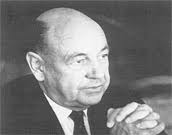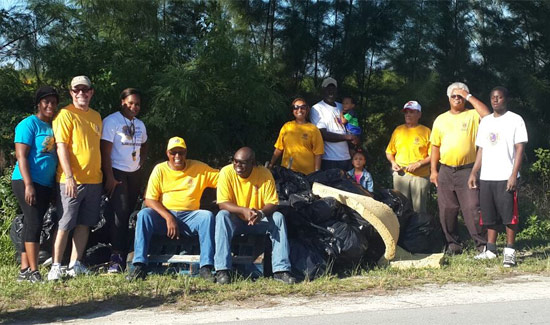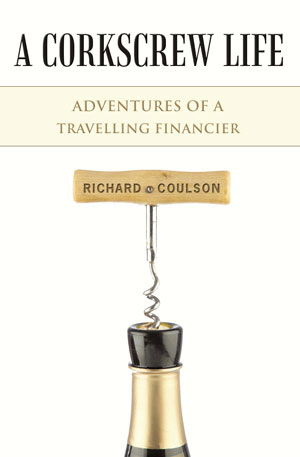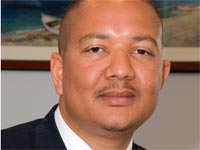
The founding of Freeport City in 1955 was a major accomplishment for Wallace Groves and the Grand Bahama Port Authority. The Hawksbill Creek Agreement was signed on August 4, 1955 by Wallace Groves and the United Bahamian Party (better known as the Bay Street Boys).
The UBP and Wallace Groves wanted to establish another city in The Bahamas. Freeport would be called the nation’s second city. The founding of another city was very crucial to the nation’s development. Even in the 1950s many ‘Out Islanders’ were leaving their homes to go the nation’s capital in search of employment opportunities. Had Freeport not been founded by Groves, New Providence would have been grossly overpopulated today.
According to the agreement, the city would be a free trade zone. Groves was given a mandate by the UBP to transform a swamp land into a bustling city. The colonial government granted 50,000 acres of land to Groves for development. There were amendments to the Hawksbill Creek Agreement in 1960 and 1966.
Wallace Groves came to The Bahamas in the 1940s after serving time in Danbury Penitentiary for mail fraud. He had been a very successful financier in New York City during the 1930s. In 1946 Groves purchased the Abaco Lumber Company. Many out islanders were employed at the lumber company in the 1950s. In 1955 Groves sold his interest in Abaco Lumber Company to National Container Corporation for $4 million. He then turned his attention to developing a second city in The Bahamas.
The UBP gave to Groves many generous concessions, much to the chagrin of the Progressive Liberal Party. The Port Authority was, for all intents and purposes, a quasi-government. The Port Authority had complete control over the casinos and was allowed, under the Hawksbill Creek Agreement, to issue business licenses and work permits. The Port also had control over immigration and customs. Mr. Groves and his board of directors at the Port Authority could determine who could enter the Freeport area. The principals at the Port were also given permission by the UBP to determine the rates for utility services.
Many expatriates settled in Freeport City during the 60s. Noted historian Michael Craton has pointed out in his groundbreaking book, Pindling: The Life and Times of the First Prime Minister of The Bahamas, that many white Americans from the southern states also migrated to the second city during the 60s.
Many of these white Americans were racist. There were allegations back then that many of the white expatriates in Freeport practiced discrimination against black Bahamians. Black Bahamians were not welcomed in the city. In fact, it was very difficult for the average black Bahamian to rent an apartment in Freeport during the 60s.
While the white citizens of Freeport City lived in nice houses with modern amenities, many black Bahamians were relegated to the grossly underdeveloped settlements of Hunters, Pinder’s Point, Lewis Yard, Eight Mile Rock, Williams Town, Smith’s Point, High Rock, McLean’s Town, Holmes Rock and West End.
Many of the houses in these settlements were dilapidated. The residents in these impoverished communities lacked even basic amenities like running water and electricity. Grand Bahama in the 50s and 60s was truly an island of two extremes. While many black Bahamians lived in squalor, the expatriates in Freeport lived in prosperity.
After the PLP defeated the UBP in 1967, the new government pledged to open the door of the city of Freeport for black Bahamians. Prime Minister Lynden O. Pindling also vowed to revise the Hawksbill Creek Agreement. Up until this point in its young history, Freeport had been a segregated city.
The PLP wanted to Bahamianized Freeport. Many of the white expatriates were against this. This crisis came to a head in a controversial speech PM Pindling delivered on July 26, 1969 at the official opening of BORCO. In 1969 Groves sold his interest in the Port Authority to Benguet International for $80 million. In 1978 Groves sold his interest in the Port Authority to Intercontinental Diversified Corporation for $38 million.
In this famous ”Bend or Break” speech, PM Pindling warned the Port and its group of licensees that his PLP government would end their discriminatory practices. Pindling stated in his speech that if the Port Authority refused to bend it would be broken (Michael Craton). Many of the expatriates and licensees in Freeport became alarmed after hearing PM Pindling’s moving speech.
In fact, many of these expatriates began leaving Grand Bahama in droves. Analysts have blamed the PLP for the ensuing recession that hit Freeport in the early 1970s. They believe that Pindling’s ”Bend Or Break” speech had precipitated the devastating recession. Even the two PLP MPs for Grand Bahama, Maurice Moore and Warren Levarity, had blamed Pindling for Freeport’s economic woes.
In fairness to the PLP government, though, the recession in Freeport was triggered by the 1970 recession in the United States. Nevertheless, there are still those who insist that Pindling’s speech had caused the recession. These critics of the speech have pointed out that Freeport lost many middle class and wealthy expatriates. As was mentioned above, they were opposed to the PLP’s Bahamianization policy for Freeport.
Perhaps Freeport’s greatest years were in the late 1960s. During this period, Freeport’s economy experienced phenomenal growth.”During the mid to late 1960s,” according to historian Michael Craton, ”Freeport had a residential section, Lucaya, some 214 miles of road and hundreds of buildings, including six hotels, three 18-hole golf courses, two casinos, a hospital/clinic, modern schools, an international shopping centre and a modern international airport already handling the giant jets” (History of the Bahamas, page 269).
Freeport also had a modern harbor, thanks to billionaire Daniel Ludwig. Also, the BORCO refinery opened its multimillion dollar facility in the late 60s. Freeport also had a cement plant, a pharmaceutical factory and an oil bunkering facility (Michael Craton, Pindling, page 165).
Incidentally, this bunkering company would later be renamed FOCOL. For years Freeport City has been considered the industrial capital of The Bahamas. However, the city has lost its momentum since 1970. It can hardly be called the magic city. Wallace Groves wouldn’t be too thrilled at the present condition of Freeport City. Had Groves been alive today, he would have chided both the government of The Bahamas and the Grand Bahama Port Authority for their senseless standoff. He would have also reminded both entities that they have a responsibility to the citizens of Freeport.
Until both of them put aside their petty differences and work together, Freeport’s economy will continue to struggle.
Freeport used to have one of the most robust economies in the region. But those years are now in the past, notwithstanding the several years of phenomenal economic growth Freeport enjoyed during the mid to late 1990s. Something drastic must be done to resuscitate the dream of the founder of the nation’s second city. Freeport is presently losing its second city status. We cannot allow it to shrivel and die.
Wallace Groves died in 1988 at the age of 86 in a Miami hospital. He had succumbed to a devastating stroke he had suffered nearly a week before his passing. While there is no denying that the ambitious Virginian financier had his faults, it cannot be denied, however, that he had made significant contributions to the people of The Bahamas. All Bahamians owe him a debt of gratitude.
It seems, though, as if many Bahamians are only interested in crediting Sir Lynden for opening the doors of Freeport for blacks. When they mention the name Wallace Groves, however, it is when they lambaste the man for the discriminatory practices of the Port Authority during the 50s and 60s. The founder of Freeport City, it seems, has been relegated to the bone yard of human history.
His legacy has been largely forgotten. His role in the formation of the second city has been either ignored or downplayed by many. Yet tens of thousands of Bahamians have benefitted from the vision of Groves. Let us not forget that thousands of Bahamians, Turks Islanders and Haitians have migrated to Grand Bahama in search of a better life. And this was because of Freeport’s prosperity.
Black Bahamians must accept the stubborn fact that without Wallace Groves, there would have been no Freeport City for Sir Lynden to open up. How is it possible that in a 21st century Bahamas we have no video documentary on the formation of Freeport and on the life of its founder?
The Broadcasting Corporation of The Bahamas and the Grand Bahama Port Authority have got to produce a documentary film on the life of Wallace Groves. The life and legacy of Wallace Groves must be taught in our schools throughout The Bahamas. To neglect the study of his life would be shortsighted and scandalous. Bahamians must learn to give credit where credit is due. We must stop being so petty!
By: Kevin Evans



